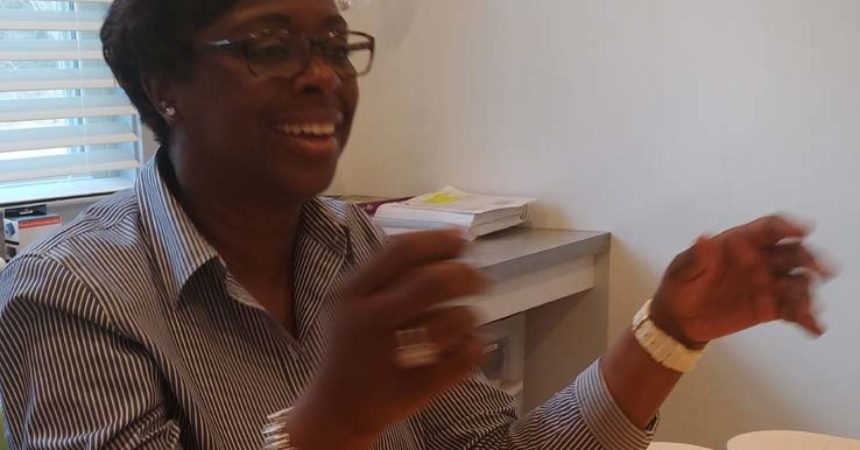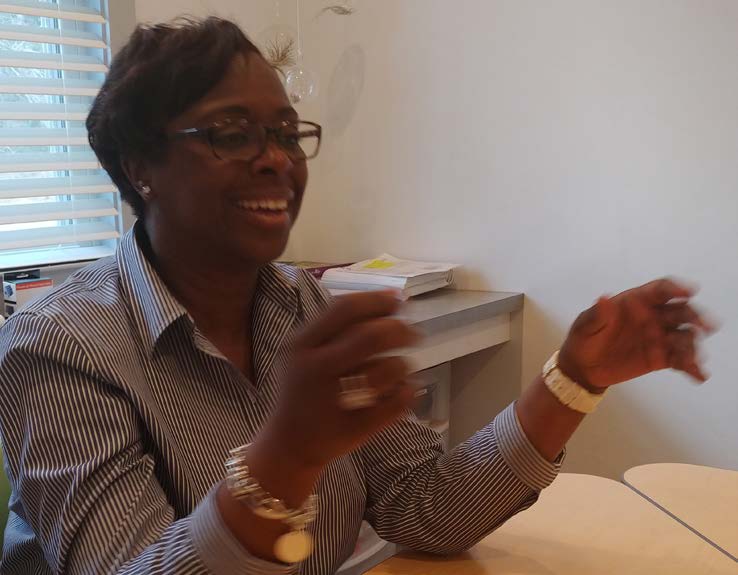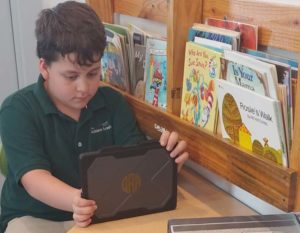
Retired principal gives special-needs children a classroom of their own

Adriane Peters opened Achieve Academy three years ago for students with special needs. Photo by St. Clair Murraine
By St. Clair Murraine
Outlook staff writer
With more than two decades of experience in the classroom, Adrianne Peters has seen enough to know that students with special needs don’t learn well in a traditional setting.
She set out to find a fix three years ago, opening Achieve Academy. She had just one student to begin with, using the general mail to get the word out.
“I just sent out to any and everybody I could get to,” said Peters, who today has nine students. She hopes Achieve Academy becomes a model that goes beyond the small building where her school is housed on Brevard Street.
Peters is a former principal at FAMU DRS and later at Governor’s Charter. She had previously spent several years in the classroom, where she estimated that between 10 to 20 percent of special-need students struggle to grasp lessons.
Achieve Academy is the latest school of its kind to spring up in the state. They solve an issue in education that hasn’t gotten too much attention, Peters said.
A 2007 survey by the Census Bureau found that more than 41 million Americans have some kind of disability that makes learning challenging. Children ages 5 to 15 accounts for 15 percent of people in the survey.

Asheton Rider says learning is easier for him in the small setting of Achieve Academy.
Additionally, a recent study has found that 13 percent of all school age children nationwide are getting special education. The study has resulted in an ongoing research at universities like FSU to identify children with learning disability at an early age.
While most Leon County Schools have special needs children, they often find it difficult to fit in with mainstream students, Peters said. Situations like those can make a special-need student uncomfortable, she said.
“That’s when you start thinking they are acting out (with) discipline issues,” Peters said. “But there is a level of frustration that builds up in them so they just act it out. It’s not that they have discipline issues.”
Meanwhile, Peters is making the struggles of special-needs students her single focus. She appears to be researching in detail the various problems students with special needs face. She is possibly looking into various articles on the different types of disabilities, types of reading disabilities, and similar others in order to form a better understanding of the problem and find a viable solution for her students.
“I felt that we were doing a disservice to that population,” she said, referring children who have a tough time in the classroom. “I wanted to see if those children were given an environment that focuses on their strength and not necessarily their weaknesses would they be able to learn.”
It seemingly is working, as her students vouch that it does.
“I like it because it makes me think,” said 10-year-old Hunter Bays.
Students being to arrive for classes as early as 7:30 a.m. When they are all settled in, Peters and her staff of three use what she calls a “bit-size” system to teach the children.
They are grouped by skill level for periods of 90-minute blocks for each subject. However, during that time, they rotate learning stations every 20 to 30 minutes.
Some of their work is on iPods, which they use with headphones.
Rajah Shefield, an 11-year-old who attended Governor’s Charter, said studying has become easier for him, especially his favorite subjects reading and math.
“I learn a lot because I love to read a lot,” he said. “We have reading groups and sometimes it’s a long reading.”
Like Peters, recently retired teacher Kimye Chaires, said she is assisting at Achieve Academy because of her passion for helping children with special needs. It’s gratifying, too, said Chaires, a former behavioral specialist with Leon County Schools.
“Seeing the growth when you’re working with them and they are struggling with the concept or an idea and all of the sudden you see the light come on when they say I get it now,” she said.
Asheton Rider, 12, is one of the students who have shown progress in learning. He attributes that to being in a smaller surrounding than he did when he attended Kate Sullivan School.
“There isn’t a bunch of kids yelling and everything,” Rider said. “Every class I went to before was really annoying and I had to wear headphones to drown the noise out.”
Keeping Achieve Academy opened with just nine students is a challenge, Peters said. The results seemingly make it worth the while, though.
“I don’t want quantity over the quality of instruction. So often that is what we do,” she said. “But I want to make sure that what I thought would work could work.
“If I could do it with six or nine, imagine what I could do with 25. But to me it’s important that our class sizes stay small.”







